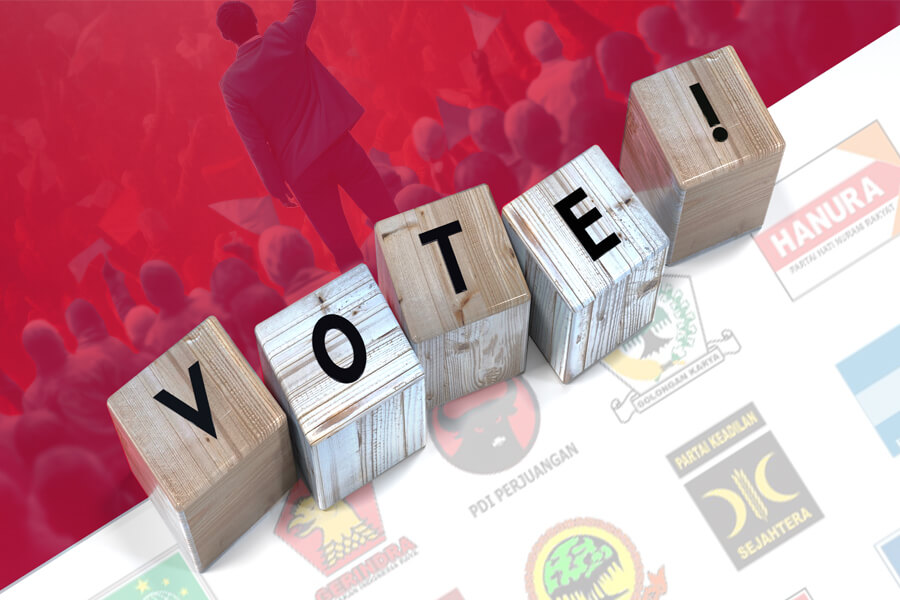The need of political stability for peaceful 2024 general elections

Political stability is needed as the main pillar to maintain peace in the 2024 general election process. Political stability creates a solid foundation for conducting elections in a peaceful and organized manner. Maintained security and order will enable people to participate in the political process, without being hampered by security threats or political uncertainty.
Maintaining political stability is therefore a key to ensuring that elections run smoothly, fairly and deliver results that represent the voice of the people. So along with the need for political stability, it is important to promote the “Stop Blasphemy” campaign in welcoming the 2024 General Election. The practice of blasphemy can undermine the democratic process by creating polarization and conflict among communities.
At the same time, blasphemy can have serious impacts on various aspects of society. Among other things, its impact is felt in the social context, where the practice can create tensions between individuals and groups. Blasphemy and personal attacks can damage relations between citizens, even dividing social solidarity.
The next impact is on the sustainability of democracy and the political process. Blasphemy can obscure the substance of the political issues that should be discussed, shifting the role of a debate from a policy-shaping platform to an arena for personality attacks. This has the potential to reduce public participation in the political process, as they may become bored or disillusioned with the high level of rhetoric.
It is thus incumbent upon political leaders and public figures to play an important role in creating a better communication culture. They can play this role as models and avoid the practice of blasphemy and build a positive communication culture. This is an important step to strengthen the foundation of social and political stability.
By promoting communication ethics and emphasizing the importance of focusing on substantive issues, society can create an environment that supports constructive dialogue and aims to find common solutions. Thus, stopping blasphemy will not only create a positive atmosphere for the 2024 elections but also strengthen the foundation of democracy within it.
So stopping blasphemy becomes even more crucial in the context of elections, where the political atmosphere is often characterized by sharp rhetoric and one-sided campaigns. The practice of blasphemy in the context of elections can damage the democratic process and negatively influence public opinion. People should focus on the substance of candidates’ programs and policies, rather than getting caught up in irrelevant personal attacks.
In building political choices, it is important to encourage quality and fair discussion. Focusing on candidates’ ideas, programs and visions helps voters make more informed and substance-based decisions. Blasphemy and personal attacks not only distract from important issues, but also undermine people’s trust in the electoral process itself.
Philosophers of morality such as John Stuart Mill emphasized the importance of freedom of speech in a democracy, but he also understood that such freedom must be balanced with moral responsibility. In the context of elections, free speech should be used to advance ideas and express views – without denigrating political opponents personally.
In addition, the public needs to be the guardians of ethics in the context of elections – among other things by rejecting and not spreading false or misleading information. So it is clear that stopping blasphemy is not only the responsibility of politicians, but also our responsibility as voters and members of the public in maintaining the integrity of the democratic process.
From these things, political stability is created. Thus, political stability, which is a key element in the development and sustainability of a country, is actualized. No wonder at a basic level, political stability creates a conducive environment for economic growth, investment and social development. Factors such as security, rule of law, and policy consistency have a direct impact on a country’s political stability.
At the same time, political stability plays a crucial role in maintaining peace during the electoral period. First of all, political stability creates an environment conducive to the conduct of fair and transparent elections. When a country has high political stability, parties involved in the electoral process can work without threats or disruptions that could disrupt the smooth running of the democratic process.
The term ‘security’ in this context helps ensure active participation of the public in elections, increases trust in the political system, and reduces the potential for conflict. In addition, legal stability and security are also important in keeping elections peaceful. A strong and consistently applied legal system can address potential violations of the law during the electoral process, ensure fair treatment, and maintain the integrity of elections.
There is also stability in inter-group relations, which has a positive impact on electoral peace. When different groups of people can coexist peacefully, and respect each other’s differences, the risk of conflict and tension during elections can be minimized.
In building a common understanding and reducing potential tensions that can arise during the electoral process, stability in various aspects of life has a significant impact on the success and peacefulness of elections. Therefore, stability plays a very important role in achieving peace during elections. Political stability, economy, law, security and inter-group relations are interrelated and mutually reinforcing to create a conducive environment for the conduct of democratic elections.
If these factors work in tandem, then the chances of conflict or disruption during elections can be minimized, ensuring broad participation, electoral integrity and widely acceptable results. Therefore, efforts to strengthen stability in various aspects of the country’s life are key steps in supporting peaceful and successful democratic electoral processes.
(Prof. DR. Drs. Ermaya Suradinata, SH, MH, MSI, is the former Director General of Sospol of the Ministry of Home Affairs RI, Rector of IPDN, Governor of Lemhannas RI, and currently the Board of Experts for Geopolitics and Geostrategy of BPIP RI.)
